 What exactly drives us to build gardens at Albany schools and then lead kids out to them?
What exactly drives us to build gardens at Albany schools and then lead kids out to them?
It is the Vegetable Project’s mission to create hands-on learning opportunities for children in Albany, and especially children with great needs, by building gardens, growing plants and harnessing the power of exposure to nature. But why?
We strive to make a difference in the lives of disadvantaged kids in our community who struggle academically and socially and emotionally, who withdraw in some cases and disrupt in others, and whose disengagement from school practically screams, “Why do I have to do this confounded stuff?”
Gardening isn’t more important for kids to study than all sorts of other fields. And getting hands dirty won’t appeal to everyone. But gardening, and even more significantly getting outside, offers richer opportunities to build teaching and learning around doing and touching and tasting and experiencing than much else that we can think of. And that can make a difference in distressed lives. Because real doing – for example, sowing seeds, caring for plants, cooking, composting, collecting seeds from mature plants and starting over again– engages and motivates, by offering connections across academic disciplines and making work feel meaningful.
Moreover, real doing puts important pieces of teaching and learning in a more meaningful order, by identifying real-world challenges before pursuing academic disciplines that might help address them and then by giving students a meaningful role in addressing challenges, such as by working to understand successes and failures in efforts to grow plants.
And that’s not all. We build gardens at Albany schools and then lead kids out to them because we know from experience that the connection between growing edible plants and preparing tasty dishes is so compelling that it can open doors to caring for regular academic subjects. At the very best, the hands-on learning opportunities that we create offer a surer path to getting kids to sit still in their chairs than teachers getting frustrated and demanding compliance with directions in increasingly shrill tones. It does this by helping young people with great weight on their shoulders achieve a bit of equanimity.
And please check out links to several earlier shots at answering why a garden, why the Vegetable Project and other questions that our work might raise.
–Bill Stoneman


